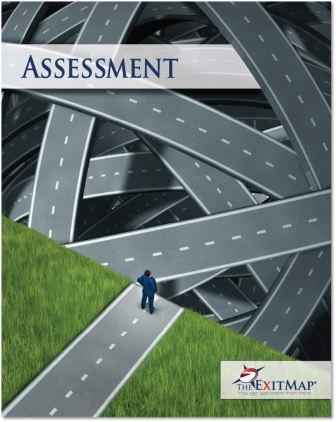Your ExitMap Blog gathers contributions from top exit planning professionals across the country that are indexed into four categories. They include select strategies for planning your exit, ideas for building your company’s value, transfer options you can choose from, or preparing to enjoy your post-exit lifestyle. This page shows the most recent posts from Your ExitMap Blog. If you are seeking a qualified exit planning professional, you can view a map of specialists here.
All articles are copyrighted by the authors, and reprinted here with permission. Each author’s contact information is available via a link at the end of the article.
Most Recent Your ExitMap Blog Articles
Most Recent Blog Articles
Selling to Employees: Is Your Exit Strategy Right in Front of You? When I interview a prospective client for exit planning assistance, we usually explore selling to employees. The first reaction is always “That won’t work. They don’t have any money.” If you have a company with reasonable cash flow, a talented management team and sufficient time, selling to employees is not only a realistic option; it may be the best way to get value from your business. I’ll define those parameters for you in a minute. If you haven’t read my eBook Beating the Boomer Bust, follow the link for the free download. My research shows that the hard numbers will inevitably translate into a hard market. ... Read more When I interview a prospective client for exit planning assistance, we usually explore selling to employees. The first reaction is always “That won’t work. They don’t have any money.” If you have a company with reasonable cash flow, a talented management team and sufficient time, selling to employees is not only a realistic option; it may be the best way to get value from your business. I’ll define those parameters for you in a minute. If you haven’t read my eBook Beating the Boomer Bust, follow the link for the free download. My research shows that the hard numbers will inevitably translate into a hard market. ... Read more What's in YOUR Nondisclosure Agreement? A Nondisclosure Agreement (NDA) has become one of the basic standard documents in every company’s wallet. Between the rising swell of Baby Boomer owners entertaining exit planning, and greater caution surrounding the legal issues of strategic partnering, an NDA is now the standard next step following many initial exploratory conversations. What should you protect in an NDA? (Note: I am not an attorney, and I don’t create Nondisclosure Agreements for clients.) First, there is the question of who is covered by the agreement. Most allow for advisors to each party to see the agreement. That can encompass accountants, attorneys, consultants, bankers and employees. I think employees present the ... Read more A Nondisclosure Agreement (NDA) has become one of the basic standard documents in every company’s wallet. Between the rising swell of Baby Boomer owners entertaining exit planning, and greater caution surrounding the legal issues of strategic partnering, an NDA is now the standard next step following many initial exploratory conversations. What should you protect in an NDA? (Note: I am not an attorney, and I don’t create Nondisclosure Agreements for clients.) First, there is the question of who is covered by the agreement. Most allow for advisors to each party to see the agreement. That can encompass accountants, attorneys, consultants, bankers and employees. I think employees present the ... Read more What the Heck is Exit Planning? The wave of Baby Boomer retirements is beginning. I’ve been writing and speaking about exit planning nationally for the last ten years, (you can download my free eBook on the subject here), but the inevitability of the demographics is gaining momentum. Today, Boomers in their late 60s are starting to sell the businesses they’ve built over the last 30 years or so. They are just the tip of the iceberg. Millions more are steadily approaching their career finish lines at a rate of hundreds every day. Exit Planning is a new discipline, developed to meet a massive market need. Unfortunately, like any new service offering, ... Read more The wave of Baby Boomer retirements is beginning. I’ve been writing and speaking about exit planning nationally for the last ten years, (you can download my free eBook on the subject here), but the inevitability of the demographics is gaining momentum. Today, Boomers in their late 60s are starting to sell the businesses they’ve built over the last 30 years or so. They are just the tip of the iceberg. Millions more are steadily approaching their career finish lines at a rate of hundreds every day. Exit Planning is a new discipline, developed to meet a massive market need. Unfortunately, like any new service offering, ... Read more Too Busy to Do Business Another tax filing season has passed, and the entire US accounting profession comes up for air. Of course, thousands of businesses and individuals have filed for extensions, thereby postponing the pain of calculating their final numbers for anywhere from a few days to six months. As the CPAs emerge from their winter burrows and blink in the sun, the rest of the business community reenergizes, suddenly able to move forward with planning and analysis that has been languishing while their numbers-crunchers were busy losing sleep and feasting on ramen noodles. I met with one firm about doing some valuation work in late February. They appeared ... Read more Another tax filing season has passed, and the entire US accounting profession comes up for air. Of course, thousands of businesses and individuals have filed for extensions, thereby postponing the pain of calculating their final numbers for anywhere from a few days to six months. As the CPAs emerge from their winter burrows and blink in the sun, the rest of the business community reenergizes, suddenly able to move forward with planning and analysis that has been languishing while their numbers-crunchers were busy losing sleep and feasting on ramen noodles. I met with one firm about doing some valuation work in late February. They appeared ... Read more What is the Right Price? Of all the misconceptions by business owners, the ones surrounding their company’s value are both the most common and often wildly inaccurate. I’ve been working for the last couple of months on the training videos for advisors in our new product, The ExitMap®. (You can take the assessment for free at www.myexitmap.com). In one session, we role-play a vignette about a financial planner discussing the value of a business with a client planning retirement. Part of it goes something like this. Q: “So Bob, how much do you expect to realize from your business when you sell it?” A: “I’ve heard from my accountant that most small businesses sell ... Read more Of all the misconceptions by business owners, the ones surrounding their company’s value are both the most common and often wildly inaccurate. I’ve been working for the last couple of months on the training videos for advisors in our new product, The ExitMap®. (You can take the assessment for free at www.myexitmap.com). In one session, we role-play a vignette about a financial planner discussing the value of a business with a client planning retirement. Part of it goes something like this. Q: “So Bob, how much do you expect to realize from your business when you sell it?” A: “I’ve heard from my accountant that most small businesses sell ... Read more The 7 Deadly Sins of an Entrepreneur -- Reprise I make no claim that using the Seven Deadly Sins as a metaphor for business behavior is original. Of course, the original concept is a codifying of “undesirable” human behaviors, or sins. The work probably comes from the Latin word sons (guilty). Various sources attribute it to Old English and Hebrew, but since Latin was the language of the church, this seems most likely. The concept of personifying the seven sins for popular consumption, as I mentioned in the first column in this series, goes back at least to Dante in the early 1300’s. It’s been used regularly in popular fiction including Roald Dahl’s Charlie ... Read more I make no claim that using the Seven Deadly Sins as a metaphor for business behavior is original. Of course, the original concept is a codifying of “undesirable” human behaviors, or sins. The work probably comes from the Latin word sons (guilty). Various sources attribute it to Old English and Hebrew, but since Latin was the language of the church, this seems most likely. The concept of personifying the seven sins for popular consumption, as I mentioned in the first column in this series, goes back at least to Dante in the early 1300’s. It’s been used regularly in popular fiction including Roald Dahl’s Charlie ... Read more The Seventh Entrepreneurial Sin -- Pride Every business owner should be proud of his or her business. If you are the founder, you built every system, and probably landed the biggest customers. If you bought the business, you took what was in place and made it fit your vision and style. But there is a dividing line between pride in what you’ve created and thinking that you are the business. Taking pleasure in seeing people add value and produce wealth is justifiable pride. Thinking that it exists only because of you is “sinful” pride. (This is the eighth in a series on The Seven Deadly Sins of an Entrepreneur. It starts ... Read more Every business owner should be proud of his or her business. If you are the founder, you built every system, and probably landed the biggest customers. If you bought the business, you took what was in place and made it fit your vision and style. But there is a dividing line between pride in what you’ve created and thinking that you are the business. Taking pleasure in seeing people add value and produce wealth is justifiable pride. Thinking that it exists only because of you is “sinful” pride. (This is the eighth in a series on The Seven Deadly Sins of an Entrepreneur. It starts ... Read more The Sixth Entrepreneurial Sin -- Envy This week we start on the two remaining deadly sins of an entrepreneur. Envy and Pride are the strategic sins. The first two (Lust and Gluttony) are operational; they interfere with how you function as an owner and leader. The middle three, Sloth, Wrath and Greed, are tactical. They interfere with how you run your business. The strategic sins twist your vision and goals for the business. The first of these, Envy, is defined in the dictionary as a feeling of discontent with regard to another’s advantages. In our business owner peer groups, we ask new members after their first Board meeting what they took ... Read more This week we start on the two remaining deadly sins of an entrepreneur. Envy and Pride are the strategic sins. The first two (Lust and Gluttony) are operational; they interfere with how you function as an owner and leader. The middle three, Sloth, Wrath and Greed, are tactical. They interfere with how you run your business. The strategic sins twist your vision and goals for the business. The first of these, Envy, is defined in the dictionary as a feeling of discontent with regard to another’s advantages. In our business owner peer groups, we ask new members after their first Board meeting what they took ... Read more The Fifth Entrepreneurial Sin -- Greed Few small business owners identify with the bloated income of Wall Street Tycoons. To accuse an entrepreneur of Greed brings up memories of the Gordon Gekko 1980’s, when “Greed is Good” seemed to be the motto of 30-something Boomers focused on the quest for success. in reality, most owners work very hard for a modest income, and feel that a little more would be amply justified. (If you are reading Awake for the first time, this series on “The Seven Deadly Sins of an Entrepreneur” starts here.) Greed in your business isn’t the quest for material success. That’s presumably why you own a business in ... Read more Few small business owners identify with the bloated income of Wall Street Tycoons. To accuse an entrepreneur of Greed brings up memories of the Gordon Gekko 1980’s, when “Greed is Good” seemed to be the motto of 30-something Boomers focused on the quest for success. in reality, most owners work very hard for a modest income, and feel that a little more would be amply justified. (If you are reading Awake for the first time, this series on “The Seven Deadly Sins of an Entrepreneur” starts here.) Greed in your business isn’t the quest for material success. That’s presumably why you own a business in ... Read more The Fourth Entrepreneurial Sin -- Wrath We continue the Seven Deadly Entrepreneurial Sins series that we started here. We’ve covered the two Operational Sins (Lust and Gluttony) that make you less effective as an owner. Sloth is the first of the Tactical sins; those that make your operation less effective. The second is Wrath. Forget the dictionary definition of Wrath, although depending on how your employees see you, the part about “referring to divine retribution” may be appropriate. <grin> Wrath is, by anyone’s definition, created by a surplus of adrenalin. If you are the founder of your business, adrenalin probably got you through long hours and late nights. It helped take your ... Read more We continue the Seven Deadly Entrepreneurial Sins series that we started here. We’ve covered the two Operational Sins (Lust and Gluttony) that make you less effective as an owner. Sloth is the first of the Tactical sins; those that make your operation less effective. The second is Wrath. Forget the dictionary definition of Wrath, although depending on how your employees see you, the part about “referring to divine retribution” may be appropriate. <grin> Wrath is, by anyone’s definition, created by a surplus of adrenalin. If you are the founder of your business, adrenalin probably got you through long hours and late nights. It helped take your ... Read more |
|
Keystone Content: Are you just beginning your exit planning journey? Here are two short articles from Your ExitMap Blog to help get you started. 3 Inarguable Reasons How prepared are you to Take a FREE 15-minute FIND A QUALIFIED EXIT PLANNER |




